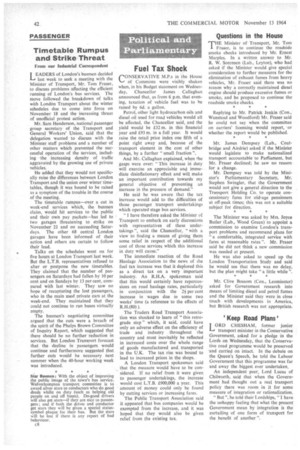Fuel Tax Shock
Page 44

If you've noticed an error in this article please click here to report it so we can fix it.
CONSERVATIVE M.P.s in the House '4.-0 of Commons were visibly shaken when, in his Budget statement on Wednesday, Chancellor James Callaghan announced that, as from 6 p.m. that evening, taxation of vehicle fuel was to be raised by 6d. a gallon.
Petrol, other light hydrocarbon oils and diesel oil used for road vehicles would all be affected, the Chancellor said, and the yield would be £32 m. in this financial year and £93 m. in a full year. It would raise the retail price index one fifth of a point right away and, because of the transport element in the cost of other things, by a further "small fraction "•
And Mr. Callaghan explained, when the gasps were over: "This increase in duty will exercise an appreciable and immediate disinflationary effect and will make an important, contribution towards my general objective of preventing an increase in the pressure of demand."
He said he was aware that the tax increase would add to the difficulties of those passenger , transport undertakings which operated stage bus services.
" I have therefore asked the Minister of Transport to embark on early discussions with representatives of these undertakings ", said the Chancellor, "with a view to finding a means of giving them some relief in respect of the additional cost of those services which this increase in duty will cause."
The immediate reaction of the Road Haulage Association to the news of the fuel tax increase was that it deplored this as a direct tax on a very important industry. An R.H.A. spokesman said that this would certainly have repercussions on road haulage rates, particularly in conjunction with the 21 per cent increase in wages due in some two weeks' time (a reference to the effects of R.H.(80) ).
The Traders Road Transport Association was shocked to learn of "this retrograde step" which, it said, could have only an adverse effect on the efficiency of trade and industry throughout the country and must inevitably be reflected in increased costs over the whole range of goods manufactured and, transported in the U.K. The tax rise was bound to lead to increased prices in the shops.
A London Transport spokesman said that the measure would have to be considered. If no relief • from it were given to passenger undertakings, the increase would cost L.T.B. £900,000 a year. This amount of money could only be found by cutting services or increasing fares.
The Public Transport Association said it appeared that bus companies would be exempted from the increase, and it was hoped that they would also be given rebel from the existing tax.
























































































































